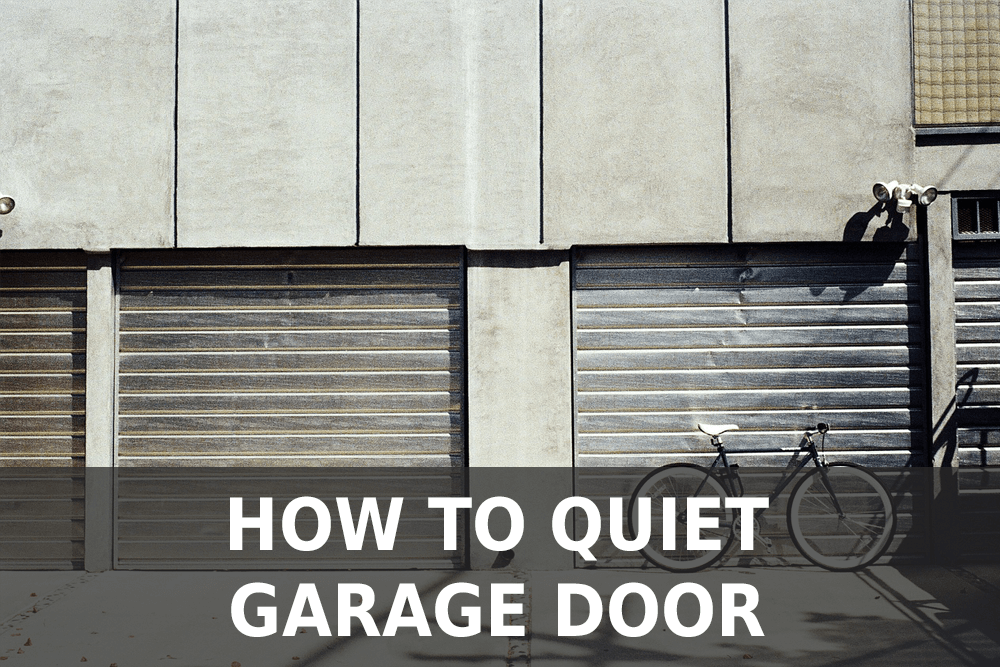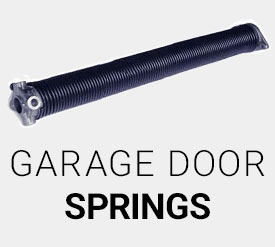It's 3 am, and you are returning from a business trip by car. Your wife and kids are sleeping in a bedroom, and the only thing you need to do to rejoin your family is to park your vehicle. Here is where the problem occurs.
The bedroom with your sleeping wife and kids is right above the garage, and they will definitely get up because of the thud of the garage door. It sounds pretty disruptive.
If you are tired of waking up your family and neighbors or setting off barking dogs every time you open and close your squeaky, creaky, and rattling garage door, you are at the right place. Many homeowners claim they can hear and feel their garage door while opening it in every corner of the house. Follow these excellent tips to curb your noisy garage door and make it quieter.
Tighten Loose Screws, Nuts, and Bolts

The first thing you should do to make your garage door quieter is to check for loose fasteners. As you know, garage doors are rather heavy. Loose nuts, bolts, and screws may cause the whole system to shake, vibrate, and produce awful sounds from being worn and torn. Focus on the track and supporting brackets. Don't forget to snug up all the fasteners with the appropriate wrenches, sockets, and screwdrivers.
Ensure that you have tightened everything up and feel lucky if it's the only reason for your garage door noise.
Lubricate Your Garage Door
This is one more easy step in making your garage door quieter. Lubricate the door’s moving parts with silicone or lithium-based lubricant specifically designed for garage doors. Apply such oil to:
- The hinges (spray the hinges between all the panels)
- The lock
- The bearing springs and plates (use enough lubricant to flow down to the base of the springs)
- The rails
- The garage door rollers (spray the inside of each track and around all the metal rollers)
Repeat this procedure every year to minimize wear-out and noise. Keep the door running smoothly.
Install a Quiet Garage Door Opener
A noisy garage door opener can be a problematic issue for your family members, especially if you have some older models that use AC-powered engines, which are much noisier than more modern DC-powered ones.
It's not the most pleasant experience when both your door and chain are constantly rattling. You may have an automatic garage door, which is rather convenient, but a noisy garage opener is like a bad apple that spoils the whole barrel. If you don’t take care of door opener noises, your door will break down and bang to a close.
Choosing the right item may be daunting, so feel free to learn about the types of garage door openers before making up your mind. Check out belt-driven ones that are more affordable, reliable, and sound-absorbing than chain-driven garage door openers. Keep your eyes peeled while choosing the big box store consumer-type models. Even though they are belt-driven, the rails usually come in 3 sections. The multi-section rail can result in excessive rail flexing and create more noise while operating.
Insulate the Garage Doors
As you know, standard construction materials for the garage door are aluminum, vinyl, or steel. These are the best contributors to noise and vibration problems. Insulation is one more garage door silencer option. Though most of the new doors come with built-in insulation, plenty of older ones require insulating panels. Such panels have numerous benefits:
- Less vibration and noise. As you already know, single-layer panels on non-insulated garage doors often rattle and quake every time you open or close them. With proper insulation, you will forget about this problem.
- Better door strength. Additional layers of insulated garage doors make them stronger and more durable than single-layer doors. You will less likely dent, rust, or warp such doors. Try out insulated steel frames which are lightweight and strong.
- Better energy efficiency. Minimize the transfer of cold temperatures into the garage with the insulated doors. The barrier will keep adjoining spaces warmer in winter and block excess heat from entering the garage in the summer. Moderate temperatures in the garage make the system more efficient and more likely to last longer.
Garage door insulation plays a crucial role in noise canceling. Insulate your loud garage door opener system with the right material. The choice of one will depend on the type of your door. For example, if you have a solid garage door, you may use mass-loaded vinyl or sound-deadening mats. These materials are dense enough to deaden vibrations and excess sounds. Make sure you've checked that your door opener can handle the extra weight before the procedure.
In addition, inspect whether the insulation strip on the bottom of the door is worn out or missing. Without an insulation strip, you may feel cold and wet coming into your garage and hear a loud banging noise when the door is closed. You can easily replace this strip by removing the old one and purchasing a roll of rubber insulation from your local lumber or garage door store.
Install Quieter Nylon Rollers
Rollers may be one more pitfall in our problem. Garage door rollers are a vital piece of the door setup, as they keep the door on track when it opens and closes. Most garage doors are steel ones. They wear out over the years, causing vibration, movement, and overall annoyingly loud noise. The truth is that the steel rollers that come with most automatic garage door systems aren't actually very high quality.
If you have decided to replace your old rollers completely, choose nylon ones. Though they are more expensive than their steel counterparts, nylon rollers are much softer, and they produce less noise.
Speaking about the process of replacing the rollers, in most cases, it's easy. The fact is that for the majority of garage doors, you simply need to eliminate the brackets which hold the rollers, draw the roller out and swap it over. If you are still afraid of replacing the rollers on your own, call a professional or read a detailed guide here.
Bear in mind that all types of rollers may quickly become damaged because of their continuous use, so don't forget to lubricate them.
Replace Extension Springs With Torsion Springs
Older garage door models often use an affordable and simple extension spring system that can wobble while using. It may not seem like a bad noise at the beginning. Over time, though, it wears out and starts to squeak and creak.
You can replace your existing garage door springs with a torsion conversion. A torsion spring system lasts for 20,000 cycles and more, which is twice as many as its extension counterpart. What is more, torsion springs are not only quieter, but they also use fewer moving parts and offer a more controlled movement of your garage door.
Please, mind that the process of the spring system replacement is potentially dangerous and difficult, so if you’re not 100% confident about your skills, hire a team of professionals to do this job for you.
Use a Garage Door Silencer to Isolate the Opener
One more way to cope with your noisy garage doors is to isolate the opener. Even the quietest garage door openers cause vibrations. As the motor housing is usually fixed directly to the ceiling joists, the vibrations travel straight into these joists and the floor above, disturbing whoever is in there.
Luckily, you may solve this problem by making little effort. Apply the soundproofing principle of decoupling (mechanical isolation). It means that you decouple your automatic garage door opener from your ceiling, dampen vibrations, and use up sound energy before it gets into the upstairs room. Such manipulations require only drilling and bolting. Thus you will separate the noise source from a structure and block the transmission path for sound waves.
In addition, try out resilient channels for your noisy garage door opener.
Conclusion
To sum up, the loud sounds that your garage door makes are not a big deal anymore. One of the solutions above will definitely help you solve noisy garage door problems.
First of all, before diving into more complex solutions, start with the full inspection. Then try to tighten nuts, screws, and bolts up, and lubricate the garage door. If it doesn't work, go on with the next tips.
Whether you are going to replace garage door hinges, check the types of garage door springs, weigh the door with extension springs, or even replace your garage door. Follow the best blog with garage-related articles to help you implement any idea!





